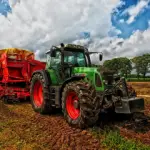
If you’ve found a property on your search for a new home and you discover it’s next to a farm or farmland, you may be asking whether it’s a good or a bad thing and should you buy it?
There are a number things to think about with houses near to farms and farmland, which is why it’s important to consider these carefully before you buy a house near a farm or farmland.
Only buy a house near a farm or farmland after researching the type of farm it is and if it’s an arable or livestock farm that may or may not give off bad manure smells. Living near a farm is a good thing, as it means you’ll be living in the countryside, but make sure to do your homework first.
Is it good to live next to a farm?
It is good to live next to a farm if you like the idea of rural countryside living, which is away from traffic noise and the pollution you get from living in a city. There are a few drawbacks depending on the farm you live next too, including manure smells from pig and poultry farms.
If you want to find out more about the advantages and disadvantages of living near a farm, please read this article about the pros and cons of living next to a farm. This articles reveals that there are more cons vs pros, but that doesn’t necessarily mean you shouldn’t buy a home near a farm.
Does it smell bad living near to a farm?
It can smell very bad if your house is right next door to a farm yard, which is especially true if the farm concerned is a pig farm or a poultry farm. The smell from pig and poultry manure is foul, and worse if the wind is blowing in the wrong direction.
I lived next to a pig farm from the age of 10 until I left home aged 18 and at times the pig smell was horrible. The smell of pig dung permeates the air and is repugnant.
Even if you don’t live next door to a pig farm, but there are pig farms nearby and these farmers use the pig manure to muck spread the fields, this can also smell really bad for a few days afterwards.
I have also had experience working in a pillow factory too, this factory used feathers from various types of poultry, and the smell from this was very strong and unpleasant too.
Having said all of that, I wouldn’t want to change my childhood, as I loved growing up living next to farms and next to nature and farmland. Living in the countryside is far better than living in a big city or living next to busy main roads in my opinion.
It does help if the local farmers are friendly, which our main one was. I worked for him for a number of years for pocket money growing up, and to save for my first car.
Is it bad living next to a pig farm?
Buying a house and living next to a pig farm can be very smelly at times, and pig manure is one of the most foul smelling dung there is from any farm animal.
Pigs can also be noisy creatures and can squeal very loudly, so if the farm is very close to the house you may hear these loud squeals from time to time too.
Having lived next to a pig farm for a big part of my childhood, I remember the smells. But I also worked on another local pig farm, and you only have to visit one of the pig pens for only a matter of minutes for your clothes to end up smelling like pig dung, which is very unpleasant.
However, the house my parents owned before this one was about half a mile from a pig farm, and we never smelt the pigs at all.
Is it bad living next to a cow farm?
Apart from the noise of mooing from cows, it’s not too bad living next to a cattle farm, as cow manure doesn’t smell too bad.
I worked on a calf farm in my teenage years, and the smell from them wasn’t too bad. This was even the case when I had to muck them out (I.e. remove their dung).
Is it bad living neat to a poultry farm?
Buying a house and living next to a poultry farm can be very smelly at times, and poultry manure is one of the most foul smelling dung there is from any farm animal apart from pigs that is.
Is it unhealthy to live next to a farm?
Living next to a farm means clean fresh air, less fumes and traffic pollution and less noise pollution, which should add up to healthy living.
But then I read this, and the paragraph below gives another perspective on how healthy or unhealthy it is living next to a farm.
“More than 25 peer reviewed scientific studies on this topic over the past 30 years. Illnesses found to occur at higher rates for people living close to agriculture include birth defects, brain cancer, autism, infertility, miscarriage, Parkinson’s Disease, immune system damage, leukaemia, developmental brain damage in children, higher rates of child cancers, non-Hodgkin’s lymphoma, autoimmune disorders, arthritis, lupus and diabetes.”
Living Near Agriculture Increases Rates of Serious Health Problems – Chem-Tox.com
I was about to say that I had no problems growing up and living next to farms, as well as working on farms as a kid to earn pocket money, but having read the above article, I am now thinking slightly differently.
I suffered from Non-Hodgkin’s Lymphoma back in 2014, and fortunately I got through the cancer. This was despite having sepsis three-times and developing fungal pneumonia.
So whilst my diagnosis of non-Hodgkin’s lymphoma may not be linked to living next to a farm for most of my childhood, you never know.
There are non-Hodgkin’s lymphoma sufferers suing weed killer companies where certain weed killers have been linked to Non-Hodgkin’s Lymphoma, so it’s possible it was as a result of coming into close contact with fertilisers and weed killers that ultimately lead to me getting cancer later in life.
I am also now looking into whether I have autism too, after listening to Melanie Sykes describe how her autism manifests, I am looking at myself as what she said resonated with how I behave. Having said that, it is my understanding that you are born with autism, and I was born in London, not near a farm.
Buying a house near a farm or farmland considerations
Vermin
Due to the nature of farming, which includes an abundance of animal feed and crops, there will be more rodents like rats and mice around, as they feed on this abundance of food. There are also many places for then to nest in farms and gather nesting material too.
Having lived in the countryside, I’ve also had to live with having many rodents near my houses for years. I’ve even had rats in my house, my parents had rats in the thatch of the thatched cottage they owned where I grew up. I also once caught 30+ mice in one house I had, but rodents would not stop me from living in the countryside or next to a farm.
One solution to this problem is to get yourself a cat, as cats are great at keeping vermin under control.
Snakes
Where snakes are to be found they are more likely to be found near farms and on farmland, as snakes will be attracted to the rodents. If you know your region doesn’t have snakes, you don’t need to worry about living with snakes nearby.
Pesticides, insecticides and fungicides
Depending on the type of farm and the farming activity, it’s likely that pesticides, insecticides and fungicides will be used to kerb pests from eating and damaging the crops. Most pesticides are potentially toxic to people, which can result in severe health consequences.
“How does pesticides affect human health? Pesticide exposures have been linked to the elevated incidence of human diseases such as cancers, Alzheimer, Parkinson, amyotrophic lateral sclerosis, asthma, bronchitis, infertility, birth defects, attention deficit hyperactivity disorder, autism, diabetes, and obesity, respiratory diseases, organ diseases and system failures.“
Pesticides and Human Health – intechopen.com
Also be aware that some farmers use airial crop spraying, which is the process of spraying insecticides, pesticides and fungicides from the air over large areas of farmland. But this can mean these insecticides, pesticides and fungicides will drift in the air to nearby homes.
But crop spraying is normally only done once a year, and when you see this happening you should go inside and close all doors and windows, this way you are less likely to be affected by the various crop spraying chemicals.
Fertiliser
Arable farmers use fertilisers to fertilise the land to allow crops to grow bigger, faster, and to produce more food, as fertiliserrs provide crops with nutrients like potassium, phosphorus, and nitrogen. But fertiliser can poison people and pets if they are inhaled or accidentally ingested.
Farm animals
The type of animals farmed will make a diffrence to the smells you experience living next to a farm or farmland and the noises you’ll hear too. Plus some livestock farming produces a lot of dust, which is mainly from the bedding, but this is especially the case with poulty farming and on pig farms.
Manure smell
If you have been a town or city dweller for the majority of your life, or if you’ve not lived next to a farm before, you probably havn’t experienced the sometimes bad smells of livestock manure. This can be particularly bad with certain livestocks, with pigs and poultry at the top of the bad smells list.
Dust and dirt
Animal bedding and dry poultry faeces produces a lot of dust, which on windy days can travel to nearby homes. Also, heavy farming machinery including tractors can transport mud and dirt on their tyres. When it rains and and the land gets wet and muddy, this mud and dirt is transferred to the local roads.
Also, during harvest when the combines are harvesting the crops in the fields, this produces a lot of dust. But this activity only happens once a year and is over quite quickly, as farmers need to get their crops harvested as soon as possible.
Farms attract flies
Due to the nature of farms and farming, especially livestock farming which produces manure, there are bound to be more flies to contend with. These flies will affect nearby homes, and the flies are more prevalent in the summer months.
Prevailing wind direction
It is worth considering the way the wind generally comes from for the majority of the time, as this will impact on what farm smells and the levels of dust you experience at the house.
Whilst the direction of the wind does change from time to time, and when it does this will have a different effect on the house, the wind will generally come from one direction for the majority of the time.
Proximity to the farm
The distance to the farm will make a difference to the impact the farm has, which includes the smells, the noises and dust levels.
Slow tractors
The other thing to know is that tractors drive slower than most other vehicles, so be prepared to be held up behind a tractor at times.
Farms operate 7-days week
Farms are a 7-day a week operation, which is especially true of livestock. Animals need feeding on a daily basis and animals will make noise each and every day.
Shooting and hunts
Farmers often allow hunting and shooting to take place on their farm, which can be noisy, and can happen on a Sunday. Shotguns can be very noisy, but this doesn’t happen every day.
Noises from farms to consider
There is a whole set of new noises to get used to when living next to a farm, which include:
- Farming vehicles and machinery: This includes tractors, combine harvesters and grain dryers, which are all pretty noisy at times. But bear in mind that certain of these vehilces and machinery, like grain dryers and combine harvesters, are only used once a year. But on the otherhand, when farmers are harvesting crops, they work late into the night and start early in the morning, becuase as the saying goes “make hay whilst the sun shines“.
- Animal noises: Animal noises to note include cokerels crowing early in the morning, cows mooing and pigs squealing.
Bear in mind with the above farm noises, and like any noises you hear near a home, you will get used to them over time. It’s like those who live in a house near an airport and live with air-traffic noise, the majority of people even get used to the noise of aircraft taking off and landing.
If the house uses well-water
If the house uses underground well-water, you should have the water tested to confirm nitrogen or nitrates and other chemical levels that may seep into the water course from nearby farming activity.
Living in a house near a farm may affect your allergies and hay fever
If you suffer from hay fever, living near a farm and farmland may bring on your hay fever. Depending on what pollen affects you and brings on your hay fever will depend on whether this will cause you a problem or not.
I recall a time when I was in a field with a student picking oat grass who suffered from hay fever. After only a few minutes of being in the field, his eyes were so swollen and streaming with tears he had to leave.
Farmland can be sold to developers for house developments
Be aware that farmland can be sold to developers and it can be built on.
My wife and I nearly bought a house that backed on to farmland and fields, only to discover there were plans to build over 400 houses on these same fields. When we asked the estate agent if there were any plans for properties to be built, they said no. So never trust what an estate agent tells you about plans for nearby farmland, always do your own research.
Final thoughts about should you buy a house near a farm or farmland
If you like the idea of fresh air, quiet, sounds of nature vs pollution, exhaust fumes, traffic noise from busy roads and too many people, then buying a house near a farm is a great idea.
It may appear from what’s been written in this article that it is bad living near a farm or farmland, but that’s not the case. It’s important you understand all of what might affect you living near a farm or farmland, so you can make an informed decision before you buy a house near a farm or farmland.
Another benefit to living near a farm is that farms offer a great opportunity for your children to work and earn pocket money. I had plenty of opportunity to work on farms growing up. I started out picking potatoes when I was about 8 or 9, I then worked on arable farms helping with the harvest, I also worked on a pig farm and on a calf farm too.
I hope you’ve enjoyed this article about should you buy a house near a farm or farmland
If you’ve enjoyed this article about “should you buy a house near a farm” please share it on your favourite social media site.
Also, if you have any questions, please feel free to comment below too. Please also share any of your experiences with properties you’ve bought. Alternatively, if you need more help, please feel free to contact us on our contact us page here. Or join the discussion and ask your question in the property forum.




